Are you ready to explore your vulnerability with these Brené Brown quotes?
As an American researcher, author, and professor, Brené Brown came up with the Shame Resilience Theory—strategies that people can apply in order to avoid the feeling of being powerless and isolated when faced with the feelings of shame.
In order to help people understand her theory, she published books like The Gifts of Imperfection, Rising Strong, and Daring Greatly.
She’s also a TED speaker who shared some of her findings and knowledge to the world. We’ve compiled her top 150 quotes to give you a sneak peek of her point of view.
Read more about this below.
And don’t miss out these Carl Jung quotes.
Best Brené Brown Quotes
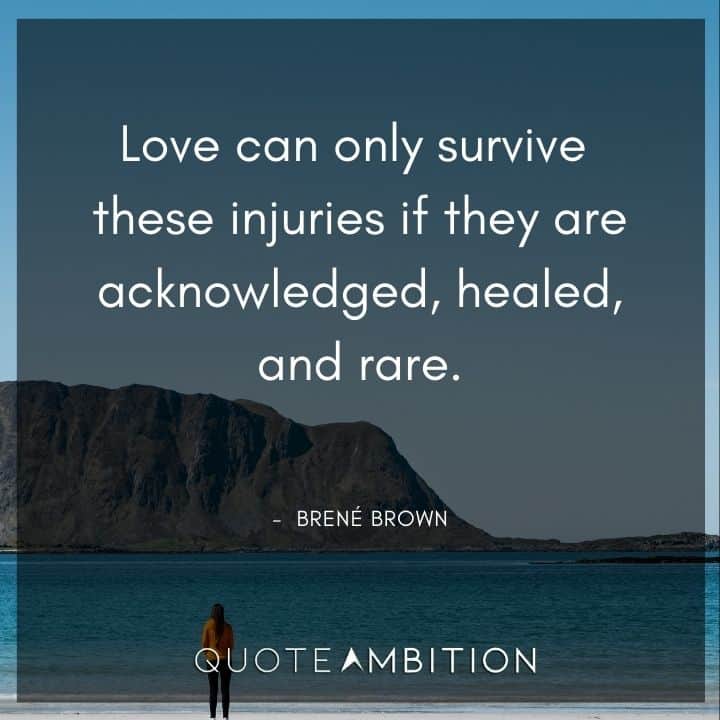
1. “Love can only survive these injuries if they are acknowledged, healed, and rare.”
2. “Owning our story can be hard, but not nearly as difficult as spending our lives running from it.”
3. “We cultivate love when we allow our most vulnerable and powerful selves to be deeply seen and known, and when we honor the spiritual connection that grows from that offering with trust, respect, kindness, and affection.”
4. “You are imperfect, you are wired for struggle, but you are worthy of love and belonging.”
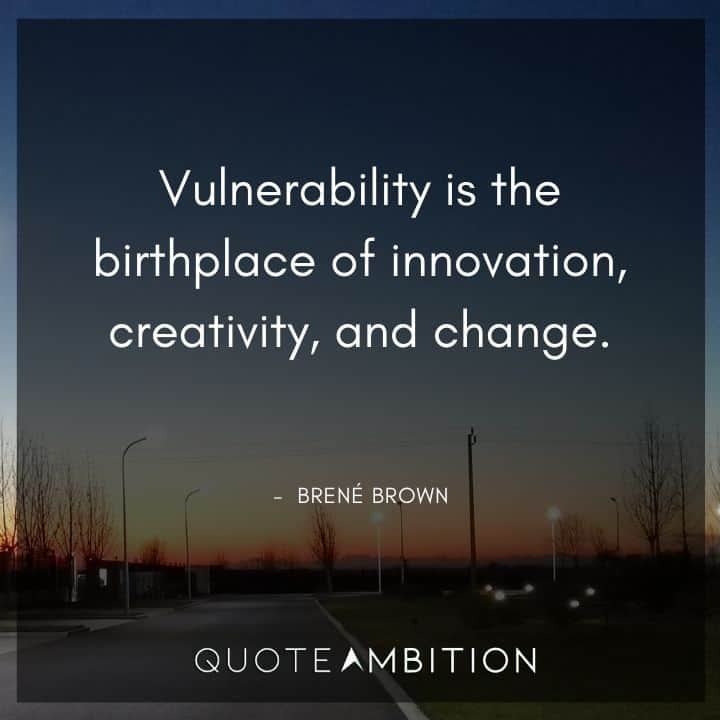
5. “Vulnerability is the birthplace of innovation, creativity, and change.”
6. “Authenticity is a collection of choices that we have to make every day. It’s about the choice to show up and be real—the choice to be honest, the choice to let our true selves be seen.”
7. “Embracing our vulnerabilities is risky, but not nearly as dangerous as giving up on love and belonging and joy—the experiences that make us the most vulnerable.”
8. “Love is not something we give or get; it is something that we nurture and grow—a connection that can only be cultivated between two people when it exists within each one of them.”
9. “Only when we are brave enough to explore the darkness will we discover the infinite power of our light.”
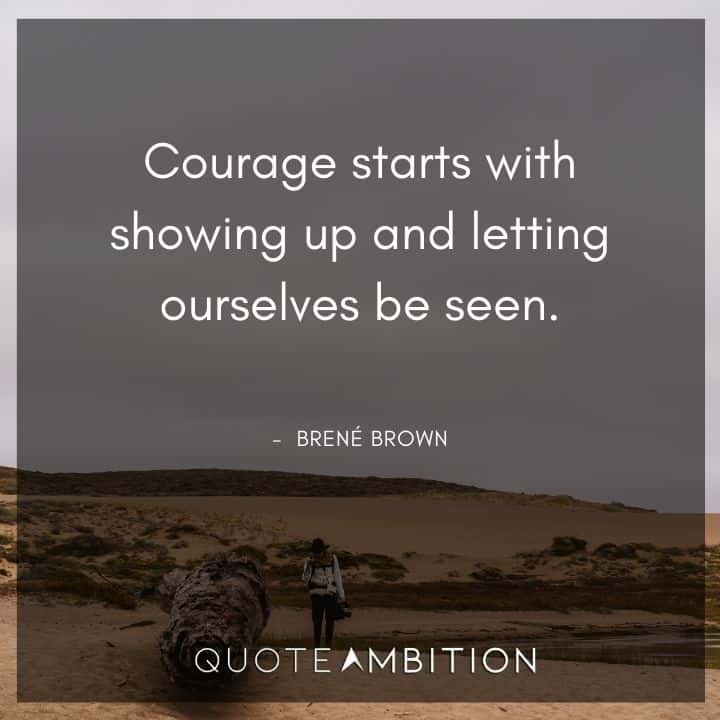
10. “Courage starts with showing up and letting ourselves be seen.”
11. “If we can share our story with someone who responds with empathy and understanding, shame can’t survive.”
12. “If we want greater clarity in our purpose or deeper and more meaningful spiritual lives, vulnerability is the path.”
13. “Shame, blame, disrespect, betrayal, and the withholding of affection damage the roots from which love grows.”
14. “Because true belonging only happens when we present our authentic, imperfect selves to the world, our sense of belonging can never be greater than our level of self-acceptance.”
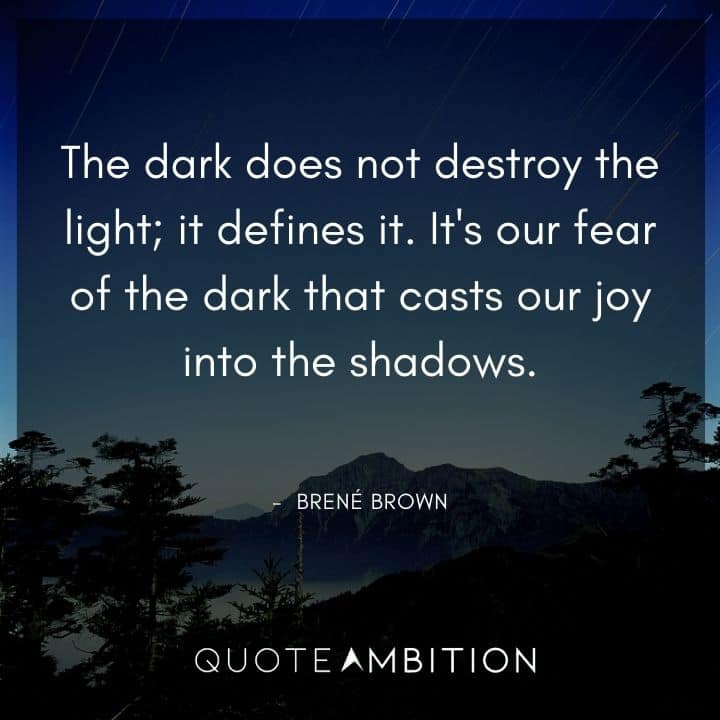
15. “The dark does not destroy the light; it defines it. It’s our fear of the dark that casts our joy into the shadows.”
16. “I define connection as the energy that exists between people when they feel seen, heard, and valued; when they can give and receive without judgment; and when they derive sustenance and strength from the relationship.”
17. “Vulnerability sounds like truth and feels like courage. Truth and courage aren’t always comfortable, but they’re never weaknesses.”
18. “Vulnerability is the birthplace of love, belonging, joy, courage, empathy, and creativity. It is the source of hope, empathy, accountability, and authenticity.”
19. “We cannot selectively numb emotions. When we numb the painful emotions, we also numb the positive emotions.”
Brené Brown Quotes on Self-Improvement and Perfection
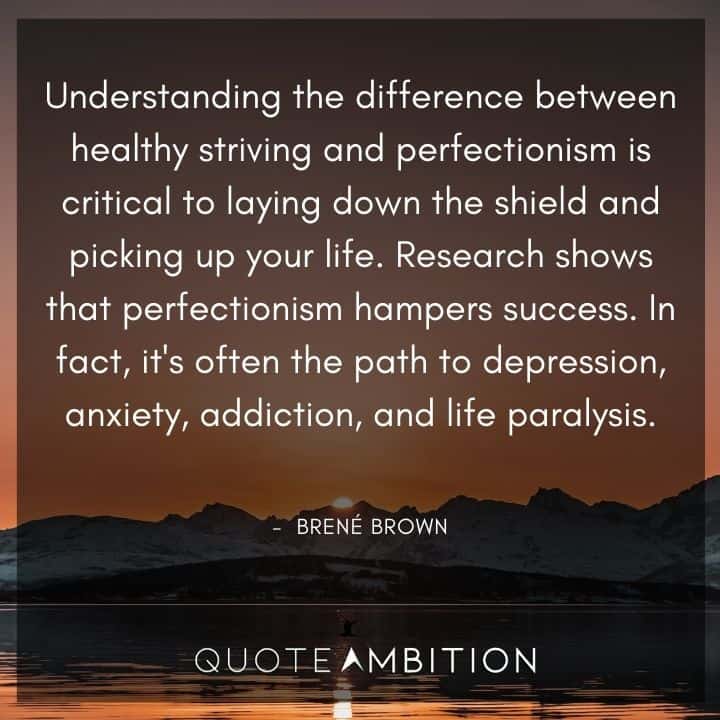
20. “Understanding the difference between healthy striving and perfectionism is critical to laying down the shield and picking up your life. Research shows that perfectionism hampers success. In fact, it’s often the path to depression, anxiety, addiction, and life paralysis.”
21. “Perfectionism is a self-destructive and addictive belief system that fuels this primary thought—if I look perfect, and do everything perfectly, I can avoid or minimize the painful feelings of shame, judgment, and blame.”
22. “Imperfections are not inadequacies; they are reminders that we’re all in this together.”
23. “What we know matters, but who we are matters more.”
24. “Healthy striving is self-focused—‘How can I improve?’ Perfectionism is others-focused—‘What will they think?’”
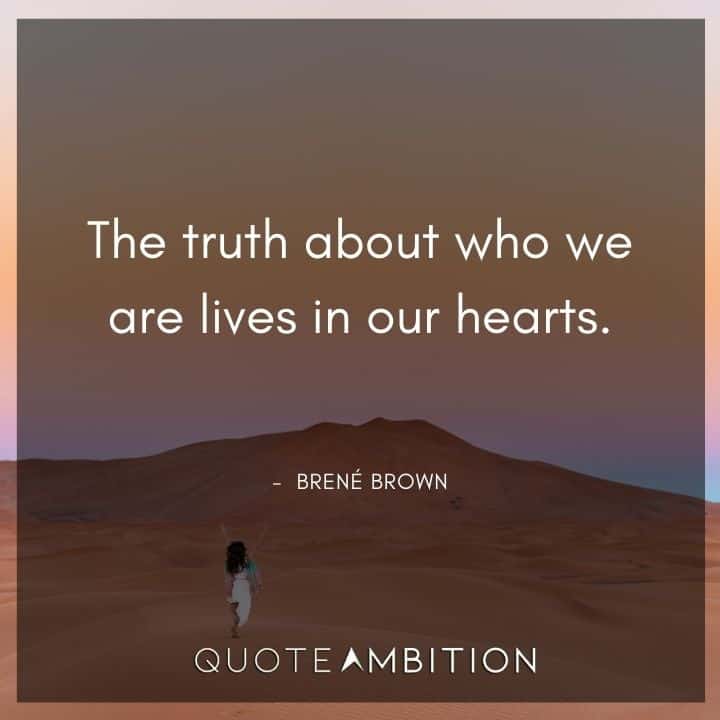
25. “The truth about who we are lives in our hearts.”
26. “Our call to courage is to protect our wild heart against constant evaluation, especially our own. No one belongs here more than you.”
27. “If you own this story, you get to write the ending.”
28. “Even to me, the issue of ‘stay small, sweet, quiet, and modest’ sounds like an outdated problem; but the truth is that women still run into those demands whenever we find and use our voices.”
29. “Perfection doesn’t exist, and I’ve found what makes children happy doesn’t always prepare them to be courageous, engaged adults.”
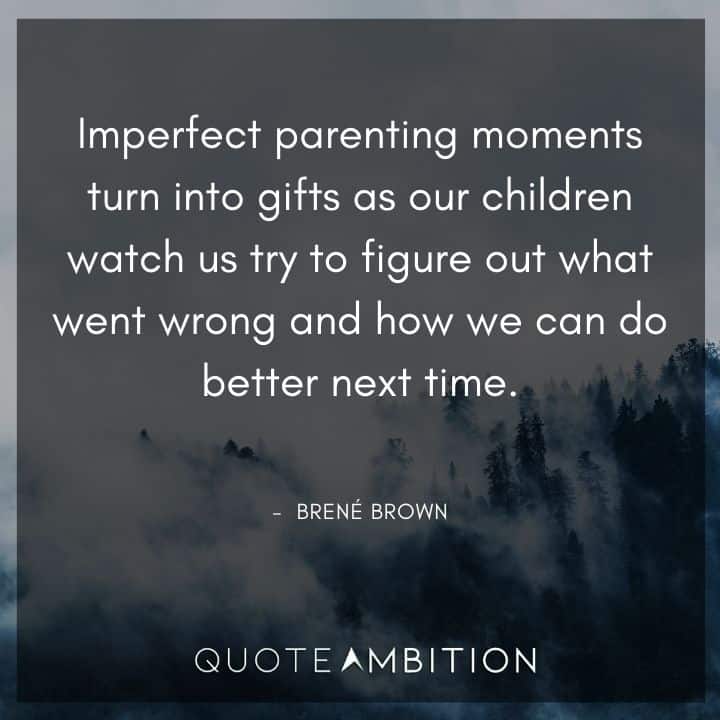
30. “Imperfect parenting moments turn into gifts as our children watch us try to figure out what went wrong and how we can do better next time.”
31. “The mandate is not to be perfect and raise happy children.”
32. “Emotional stoicism is not badassery. Blustery posturing is not badassery. Swagger is not badassery. Perfection is about the furthest thing in the world from badassery.”
33. “When the universe grabs your shoulders and tells you, ‘I’m not fucking around,’ use the gifts you were given.”
34. “Who we are and how we engage with the world are much stronger predictors of how our children will do than what we know about parenting.”
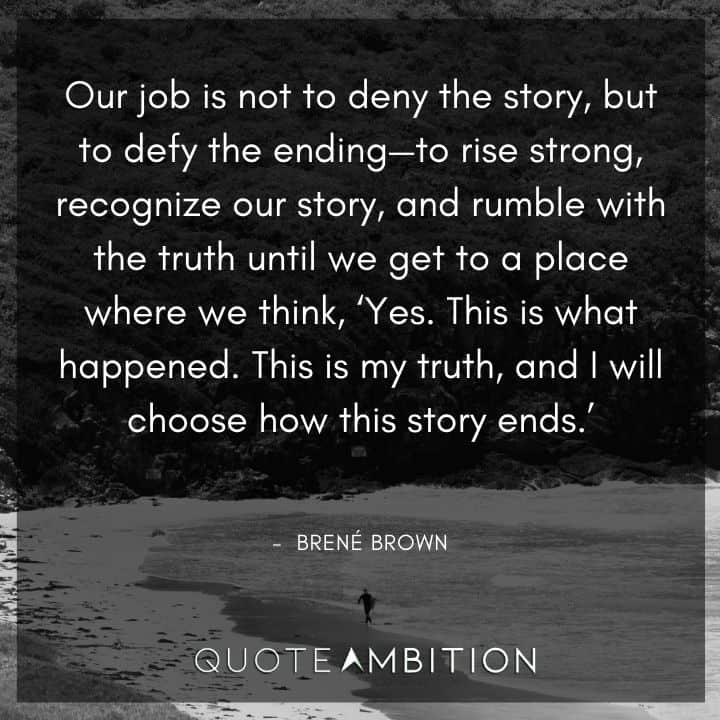
35. “Our job is not to deny the story, but to defy the ending—to rise strong, recognize our story, and rumble with the truth until we get to a place where we think, ‘Yes. This is what happened. This is my truth, and I will choose how this story ends.’”
36. “Worrying about scarcity is our culture’s version of post-traumatic stress. It happens when we’ve been through too much, and rather than coming together to heal, we’re angry, and scared, and at each other’s throats.”
37. “Those who have a strong sense of love and belonging have the courage to be imperfect.”
38. “To become fully human means learning to turn my gratitude for being alive into some concrete common good. It means growing gentler toward human weakness. It means practicing forgiveness of my and everyone else’s hourly failures to live up to divine standards. It means learning to forget myself on a regular basis in order to attend to the other selves in my vicinity. It means living so that ‘I’m only human’ does not become an excuse for anything. It means receiving the human condition as blessing and not curse, in all its achingly frail and redemptive reality.”
39. “When we own our stories, we avoid being trapped as characters in stories someone else is telling.”
Brené Brown Quotes on Authenticity and Vulnerability
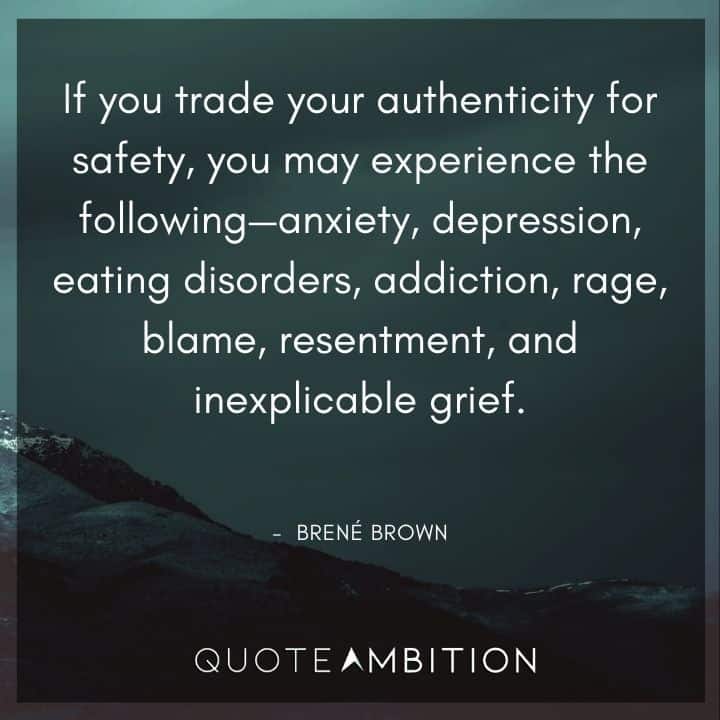
40. “If you trade your authenticity for safety, you may experience the following—anxiety, depression, eating disorders, addiction, rage, blame, resentment, and inexplicable grief.”
41. “When I look at narcissism through the vulnerability lens, I see the shame-based fear of being ordinary. I see the fear of never feeling extraordinary enough to be noticed, to be lovable, to belong, or to cultivate a sense of purpose.”
42. “I’m learning that recognizing and leaning into the discomfort of vulnerability teaches us how to live with joy, gratitude, and grace.”
43. “Nostalgia is also a dangerous form of comparison. Think about how often we compare our lives to a memory that nostalgia has so completely edited that it never really existed.”
44. “Staying vulnerable is a risk we have to take if we want to experience connection.”
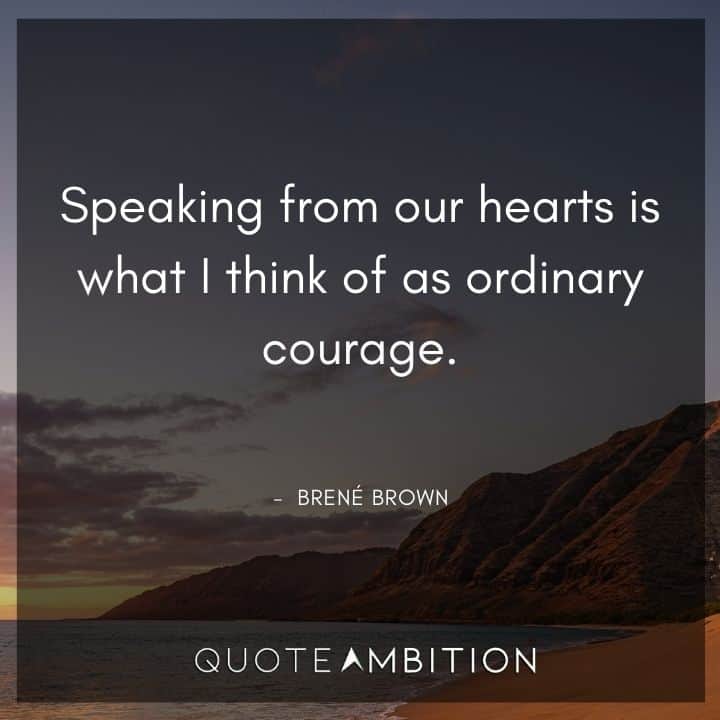
45. “Speaking from our hearts is what I think of as ordinary courage.”
46. “Worthiness doesn’t have prerequisites.”
47. “Vulnerability is not winning or losing; it’s having the courage to show up and be seen when we have no control over the outcome.”
48. “Vulnerability is not weakness; it’s our greatest measure of courage.”
49. “Somehow, we’ve come to equate success with not needing anyone. Many of us are willing to extend a helping hand, but we’re very reluctant to reach out for help when we need it ourselves.”
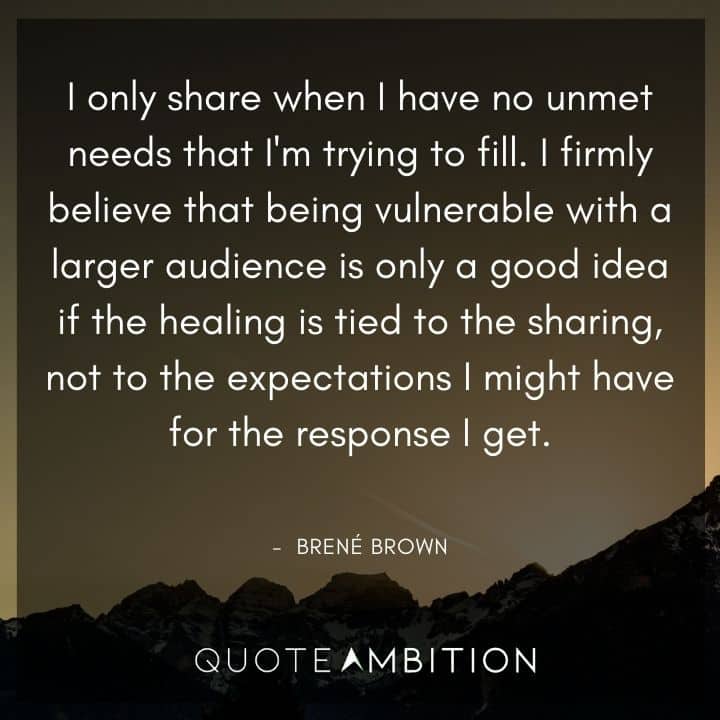
50. “I only share when I have no unmet needs that I’m trying to fill. I firmly believe that being vulnerable with a larger audience is only a good idea if the healing is tied to the sharing, not to the expectations I might have for the response I get.”
51. “I define vulnerability as uncertainty, risk, and emotional exposure.”
52. “Waking up every day and loving someone who may or may not love us back, whose safety we can’t ensure, who may stay in our lives or may leave without a moment’s notice, who may be loyal to the day they die or betray us tomorrow—that’s vulnerability.”
53. “It’s in our biology to trust what we see with our eyes. This makes living in a carefully edited, overproduced, and photoshopped world very dangerous.”
54. “There are many tenets of wholeheartedness, but at its very core is vulnerability and worthiness; facing uncertainty, exposure, and emotional risks, and knowing that I am enough.”
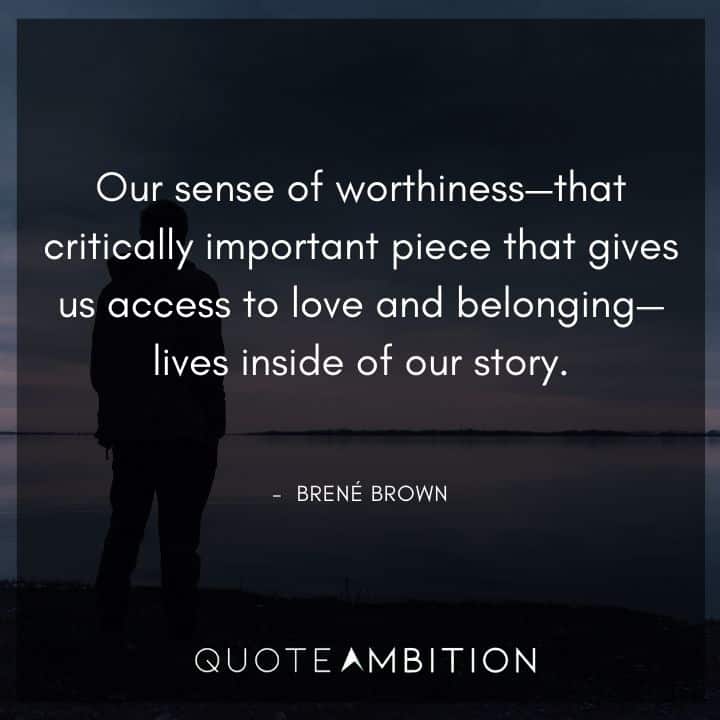
55. “Our sense of worthiness—that critically important piece that gives us access to love and belonging—lives inside of our story.”
56. “People who wade into discomfort and vulnerability and tell the truth about their stories are the real badasses.”
57. “I believe that owning our worthiness is the act of acknowledging that we are sacred. Perhaps embracing vulnerability and overcoming numbing is ultimately about the care and feeding of our spirits.”
58. “Authenticity is the daily practice of letting go of who we think we’re supposed to be and embracing who we are.”
59. “Mindfully practicing authenticity during our most soul-searching struggles is how we invite grace, joy, and gratitude into our lives.”
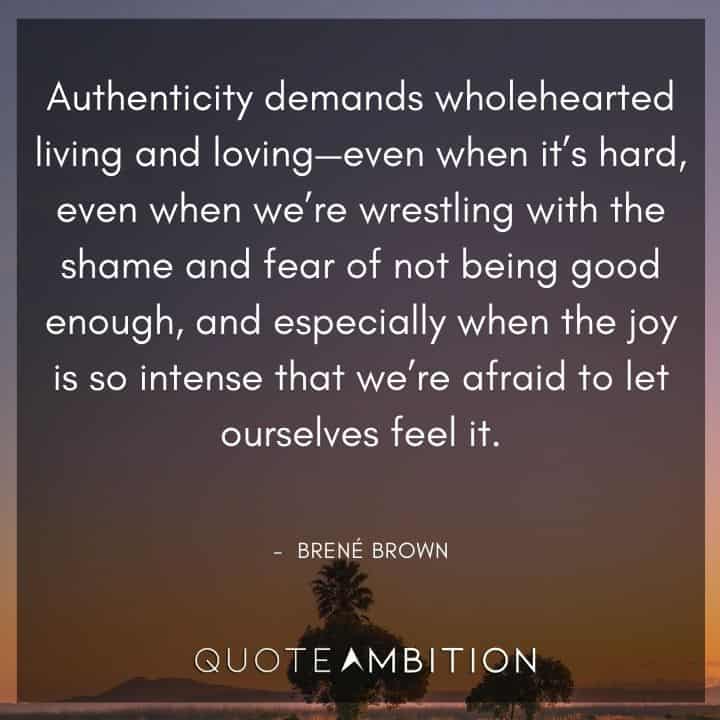
60. “Authenticity demands wholehearted living and loving—even when it’s hard, even when we’re wrestling with the shame and fear of not being good enough, and especially when the joy is so intense that we’re afraid to let ourselves feel it.”
61. “Choosing authenticity means cultivating the courage to be imperfect, to set boundaries, and to allow ourselves to be vulnerable; exercising the compassion that comes from knowing that we are all made of strength and struggle; and nurturing the connection and sense of belonging that can only happen when we believe that we are enough.”
62. “Stay in your own lane. Comparison kills creativity and joy.”
63. “If we can’t stand up to the ‘never good enough’ and ‘who do you think you are.’ we can’t move forward.”
64. “Choosing to be curious is choosing to be vulnerable because it requires us to surrender to uncertainty.”
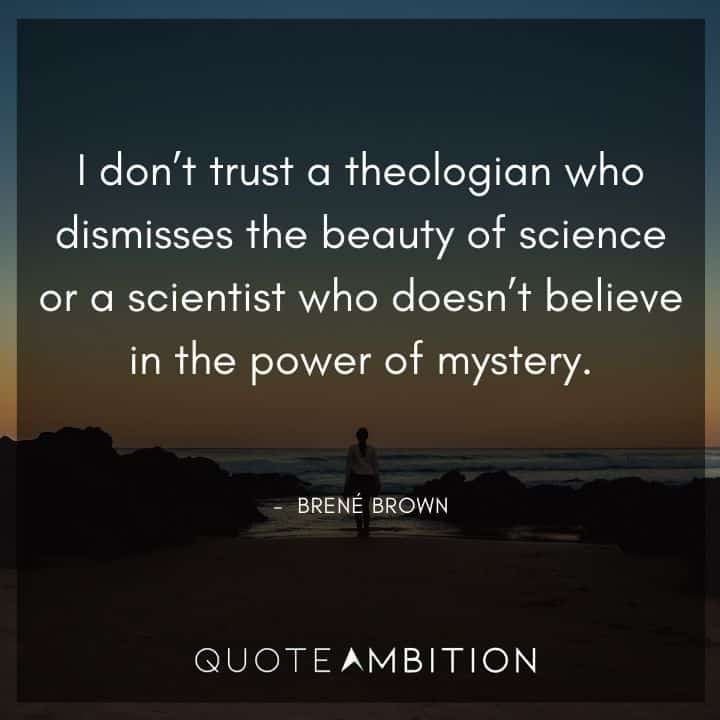
65. “I don’t trust a theologian who dismisses the beauty of science or a scientist who doesn’t believe in the power of mystery.”
66. “For me, vulnerability led to anxiety, which led to shame, which led to disconnection, which led to Bud Light.”
67. “The unraveling is a time when you are challenged by the universe to let go of who you think you are supposed to be and to embrace who you are.”
68. “There will be times when standing alone feels too hard, too scary, and we’ll doubt our ability to make our way through the uncertainty. Someone, somewhere, will say, ‘Don’t do it. You don’t have what it takes to survive the wilderness.’ This is when you reach deep into your wild heart and remind yourself, ‘I am the wilderness.’”
69. “When we feel good about the choices we’re making and when we’re engaging with the world from a place of worthiness rather than scarcity, we feel no need to judge and attack.”
Brené Brown Quotes on Morals and Ethics
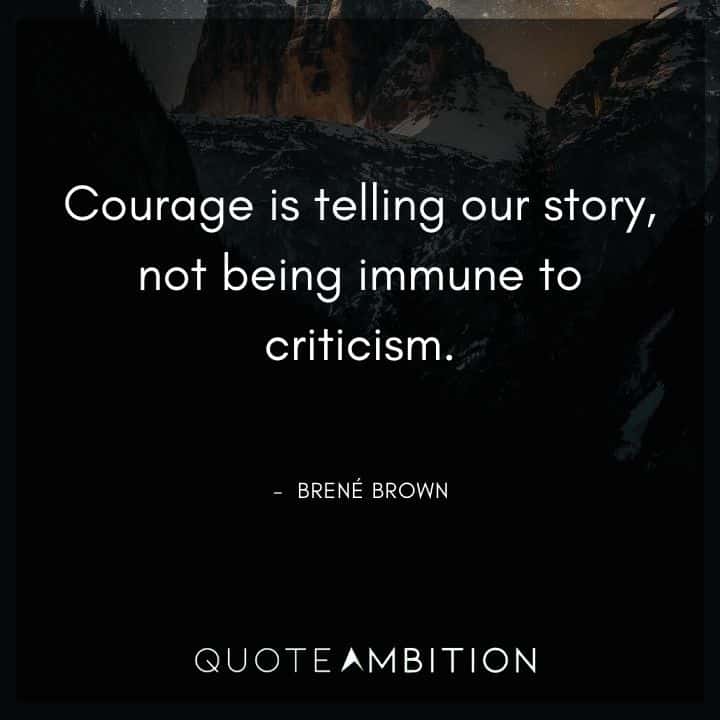
70. “Courage is telling our story, not being immune to criticism.”
71. “Shame corrodes the very part of us that believes we are capable of change.”
72. “Faith is a place of mystery—where we find the courage to believe in what we cannot see and the strength to let go of our fear of uncertainty.”
73. “What separates privilege from entitlement is gratitude.”
74. “The willingness to show up changes us. It makes us a little braver each time.”
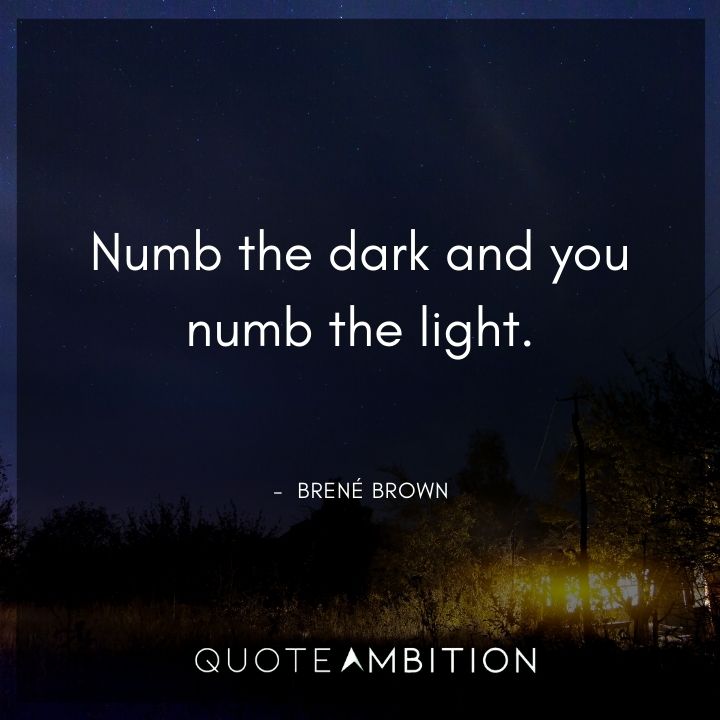
75. “Numb the dark and you numb the light.”
76. “Courage is a heart word.”
77. “In one of its earliest forms, the word ‘courage’ meant ‘to speak one’s mind by telling all one’s heart.’”
78. “We’re a nation hungry for more joy, because we’re starving from a lack of gratitude.”
79. “It’s as if we’ve divided the world into those who offer help and those who need help. The truth is that we are both.”
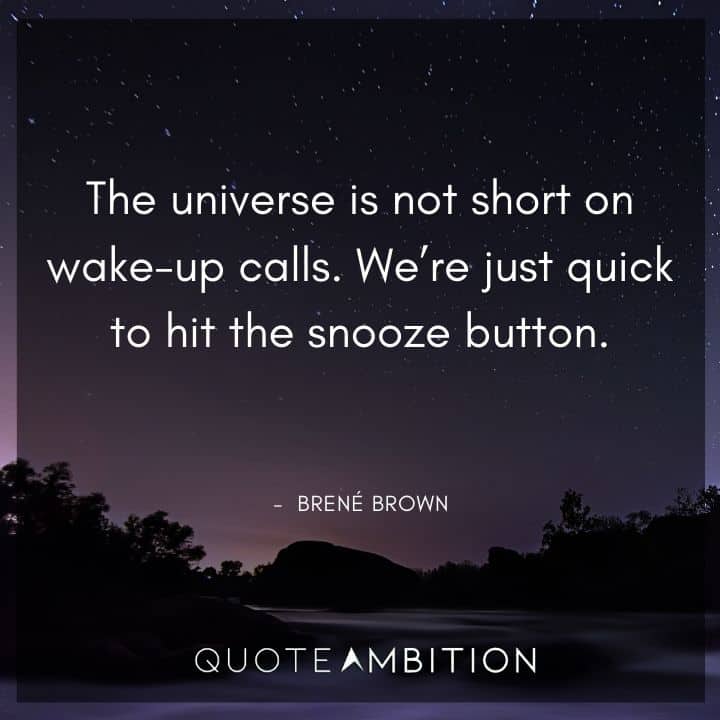
80. “The universe is not short on wake-up calls. We’re just quick to hit the snooze button.”
81. “We cannot grow when we are in shame, and we can’t use shame to change ourselves or others.”
82. “Shame works like the zoom lens on a camera. When we are feeling shame, the camera is zoomed in tight and all we see is our flawed selves, alone and struggling.”
83. “There are too many people today who, instead of feeling hurt, are acting out their hurt; instead of acknowledging pain, they’re inflicting pain on others; rather than risking feeling disappointed, they’re choosing to live disappointed.”
84. “You cannot shame or belittle people into changing their behaviors.”
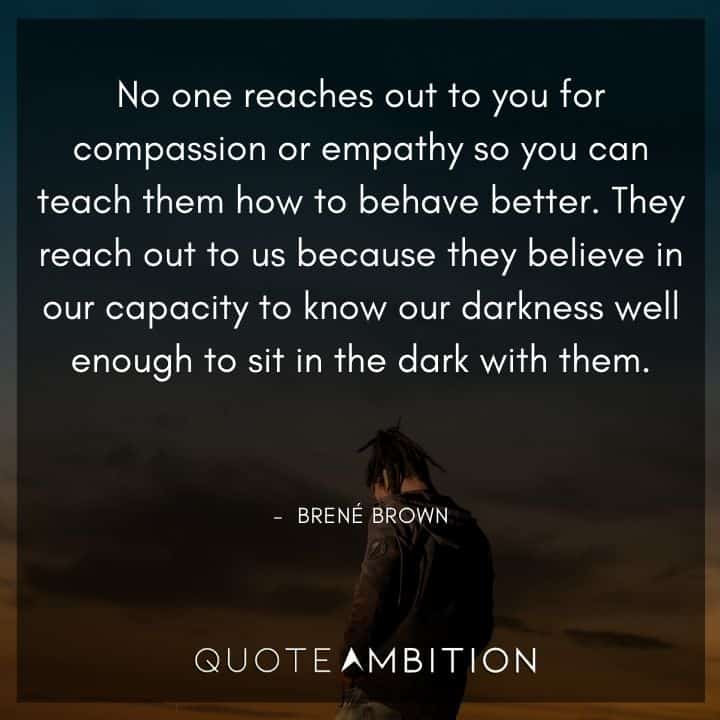
85. “No one reaches out to you for compassion or empathy so you can teach them how to behave better. They reach out to us because they believe in our capacity to know our darkness well enough to sit in the dark with them.”
86. “I want to be in the arena. I want to be brave with my life. And when we make the choice to dare greatly, we sign up to get our asses kicked. We can choose courage or we can choose comfort, but we can’t have both.”
87. “Integrity is choosing courage over comfort; choosing what is right over what is fun, fast, or . easy; and choosing to practice our values rather than simply professing them.”
88. “We live in a world where most people still subscribe to the belief that shame is a good tool for keeping people in line. Not only is this wrong, but it’s dangerous.”
89. “Cruelty is easy, cheap and rampant.”
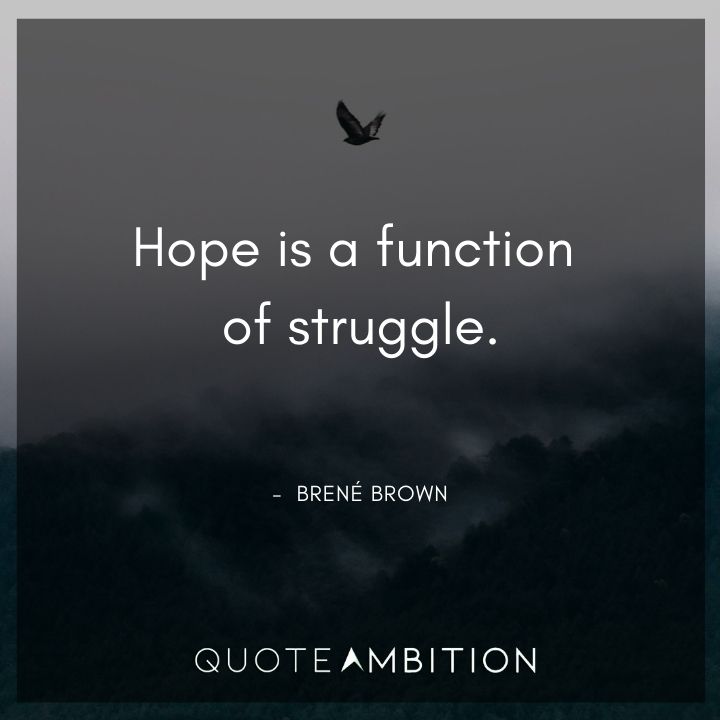
90. “Hope is a function of struggle.”
91. “Shame hates it when we reach out and tell our story. It hates having words wrapped around it. It can’t survive being shared.”
92. “Shame loves secrecy. When we bury our story, the shame metastasizes.”
93. “How can we expect people to put value on our work when we don’t value ourselves enough to set and hold uncomfortable boundaries?”
94. “When I see people stand fully in their truth, or when I see someone fall down, get back up, and say, ‘Damn. That really hurt, but this is important to me and I’m going in again’—my gut reaction is, ‘What a badass.’”
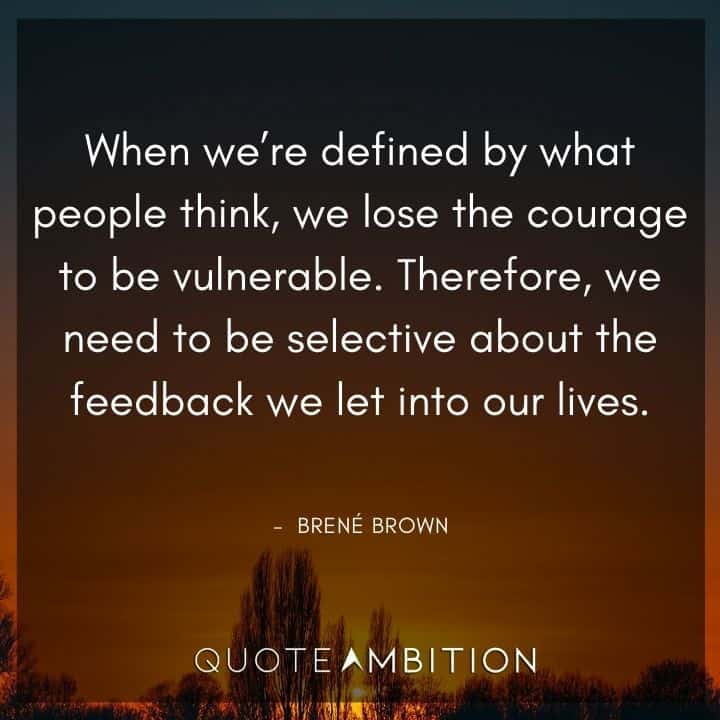
95. “When we’re defined by what people think, we lose the courage to be vulnerable. Therefore, we need to be selective about the feedback we let into our lives.”
96. “Of all the things trauma takes away from us, the worst is our willingness—or even our ability—to be vulnerable. There’s a reclaiming that has to happen.”
97. “Sometimes, the bravest and most important thing you can do is just show up.”
98. “We’re hard on each other because we’re using each other as a launching pad out of our own perceived shaming deficiency.”
99. “Show up for people in pain and don’t look away.”
Brené Brown Quotes on Love and Adoration
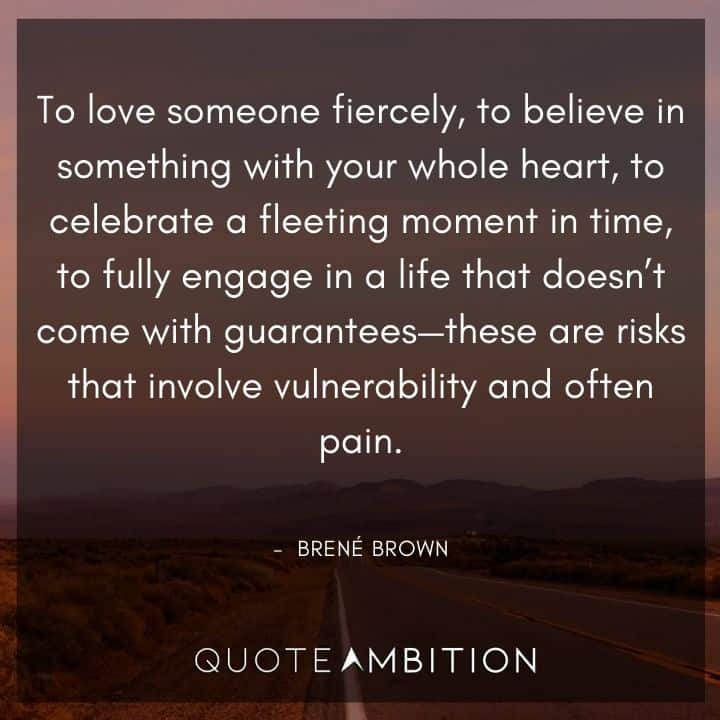
100. “To love someone fiercely, to believe in something with your whole heart, to celebrate a fleeting moment in time, to fully engage in a life that doesn’t come with guarantees—these are risks that involve vulnerability and often pain.”
101. “I now see how owning our story and loving ourselves through that process is the bravest thing that we will ever do.”
102. “Spirituality is recognizing and celebrating that we are all inextricably connected to each other by a power greater than all of us, and that our connection to that power and to one another is grounded in love and compassion.”
103. “If we have one or two people in our lives who can sit with us and hold space for our shame stories, and love us for our strengths and struggles, we are incredibly lucky.”
104. “If we have a friend, or small group of friends, or family who embraces our imperfections, vulnerabilities, and power, and fills us with a sense of belonging, we are incredibly lucky.”
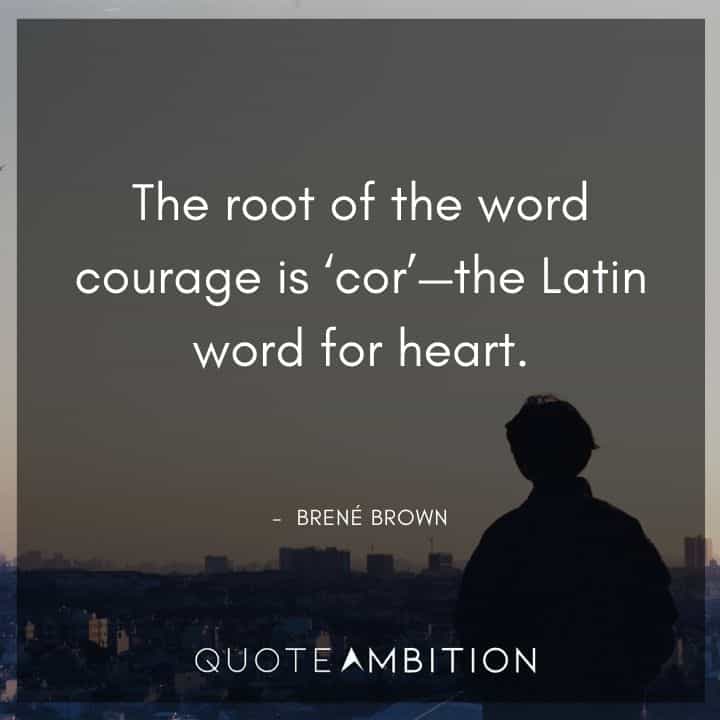
105. “The root of the word courage is ‘cor’—the Latin word for heart.”
106. “Compassionate people ask for what they need. They say no when they need to, and when they say yes, they mean it. They’re compassionate because their boundaries keep them out of resentment.”
107. “Until we can receive with an open heart, we’re never really giving with an open heart.”
108. “Just because someone isn’t willing or able to love us, it doesn’t mean that we are unlovable.”
109. “Here’s what is truly at the heart of wholeheartedness—worthy now; not if, not when. We’re worthy of love and belonging now. Right this minute. As is.”
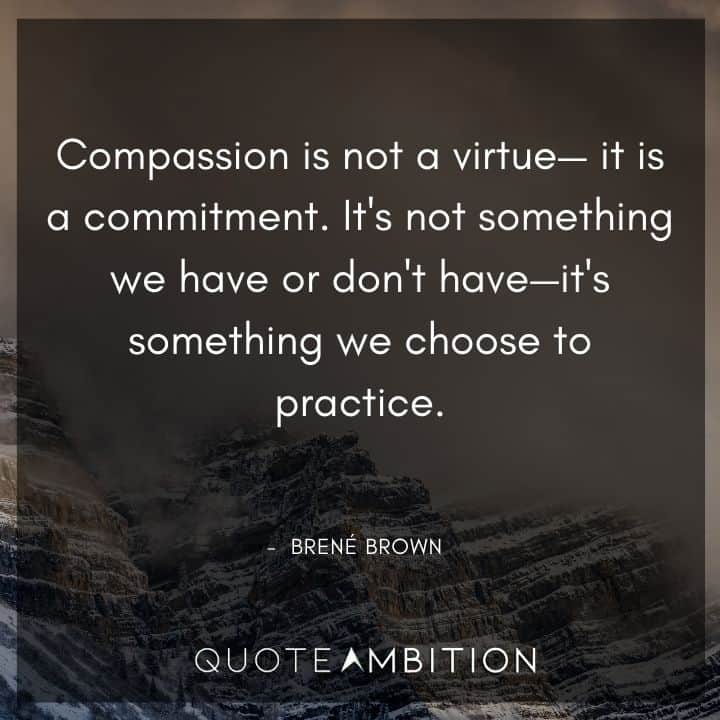
110. “Compassion is not a virtue—it is a commitment. It’s not something we have or don’t have—it’s something we choose to practice.”
111. “To love ourselves and support each other in the process of becoming real is perhaps the greatest single act of daring greatly.”
112. “Those who feel lovable, who love, and who experience belonging simply believe they are worthy of love and belonging.”
113. “Sufficiency isn’t two steps up from poverty or one step short of abundance. It isn’t a measure of barely enough or more than enough. Sufficiency isn’t an amount at all. It is an experience, a context we generate, a declaration, a knowing that there is enough, and that we are enough.”
114. “Sometimes, when we are beating ourselves up, we need to stop and say to that harassing voice inside, ‘Man, I’m doing the very best I can right now.’”
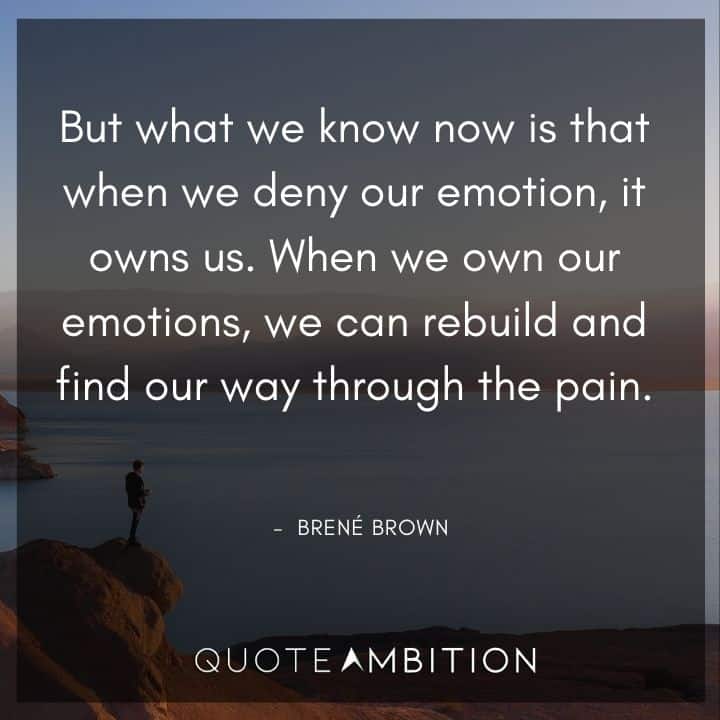
115. “But what we know now is that when we deny our emotion, it owns us. When we own our emotions, we can rebuild and find our way through the pain.”
116. “We cannot ignore our pain and feel compassion for it at the same time.”
117. “Sometimes, the most dangerous thing for kids is the silence that allows them to construct their own stories—stories that almost always cast them as alone and unworthy of love and belonging.”
118. “When two people relate to each other authentically and humanly, God is the electricity that surges between them.”
119. “The mark of a wild heart is living out the paradox of love in our lives. It’s the ability to be tough and tender, excited and scared, brave and afraid—all in the same moment. It’s showing up in our vulnerability and our courage, being both fierce and kind.”
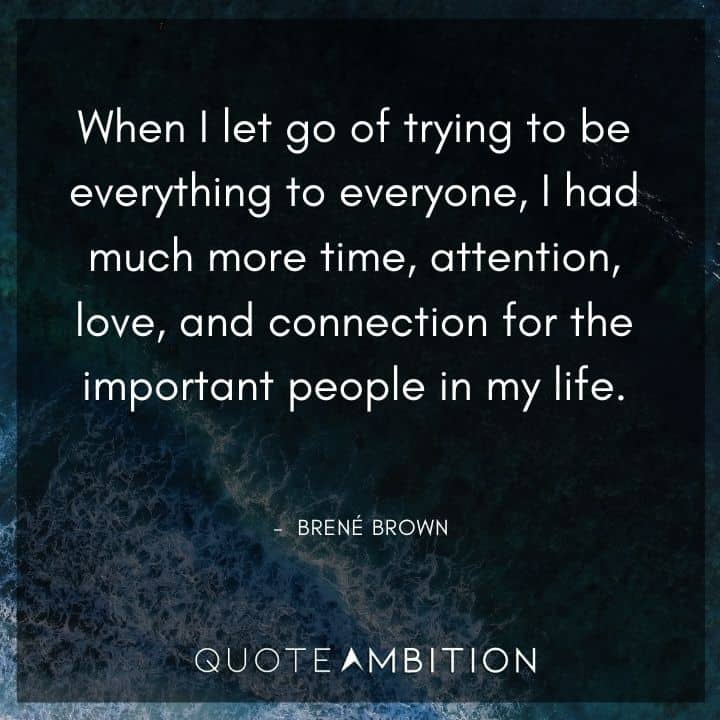
120. “When I let go of trying to be everything to everyone, I had much more time, attention, love, and connection for the important people in my life.”
121. “Boundaries are hard when you want to be liked and when you are a pleaser hellbent on being easy, fun, and flexible.”
122. “Grace will take you places hustling can’t.”
123. “We are hardwired to connect with others. It’s what gives purpose and meaning to our lives, and without it there is suffering.”
124. “When we’re anxious, disconnected, vulnerable, alone, and feeling helpless, the booze, and food, and work, and endless hours online feel like comfort; but in reality, they’re only casting their long shadows over our lives.”
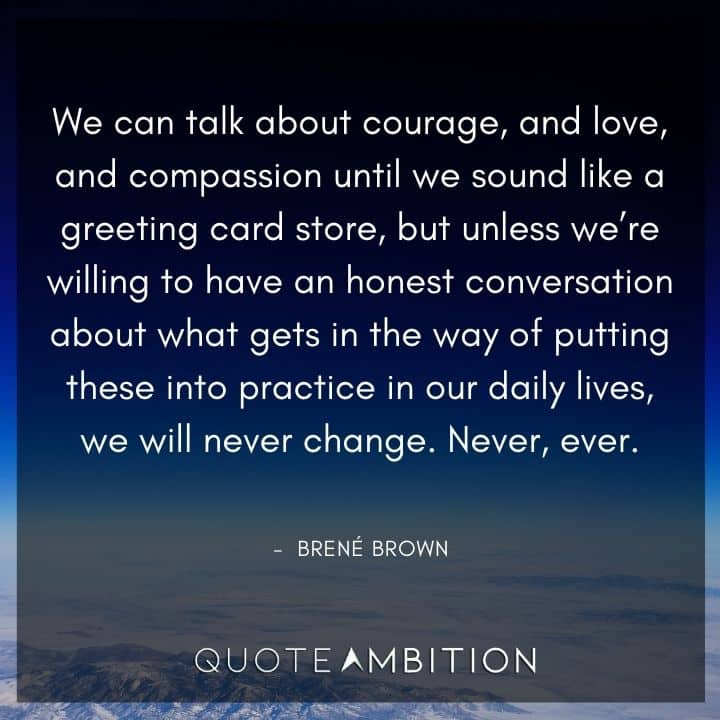
125. “We can talk about courage, and love, and compassion until we sound like a greeting card store, but unless we’re willing to have an honest conversation about what gets in the way of putting these into practice in our daily lives, we will never change. Never, ever.”
126. “If we want to make meaning, we need to make art. Cook, write, draw, doodle, paint, scrapbook, take pictures, collage, knit, rebuild an engine, sculpt, dance, decorate, act, sing—it doesn’t matter. As long as we’re creating, we’re cultivating meaning.”
127. “We can only love others as much as we love ourselves.”
128. “Stillness is not about focusing on nothingness; it’s about creating a clearing. It’s opening up an emotionally clutter-free space and allowing ourselves to feel and think and dream and question.”
129. “We love seeing raw truth and openness in other people, but we’re afraid to let them see it in us. We’re afraid that our truth isn’t enough—that what we have to offer isn’t enough without the bells and whistles, without editing, and impressing.”
Brené Brown Quotes on Life and Bonds with Others
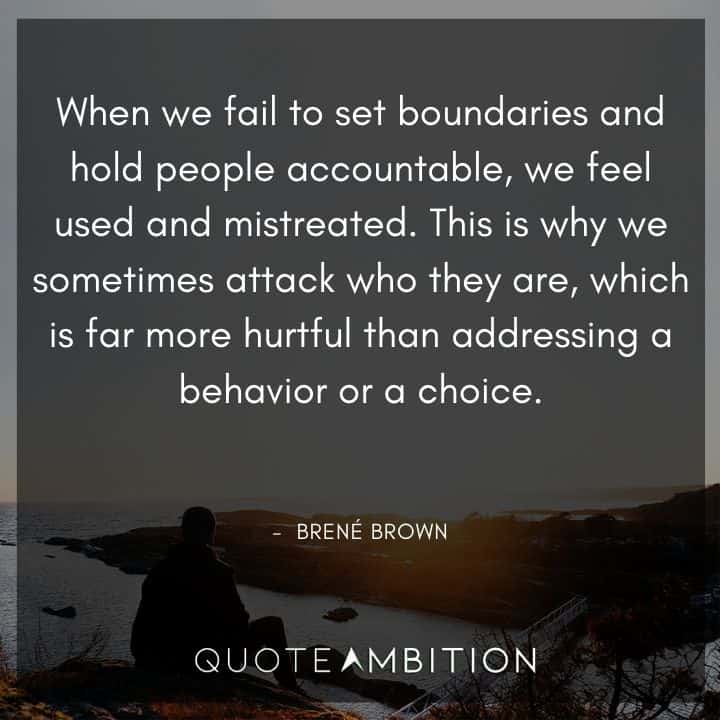
130. “When we fail to set boundaries and hold people accountable, we feel used and mistreated. This is why we sometimes attack who they are, which is far more hurtful than addressing a behavior or a choice.”
131. “Practicing spirituality brings a sense of perspective, meaning, and purpose to our lives.”
132. “If we share our shame story with the wrong person, they can easily become one more piece of flying debris in an already dangerous storm.”
133. “Our stories are not meant for everyone.”
134. “If you want to make a difference, the next time you see someone being cruel to another human being, take it personally. Take it personally because it is personal!”
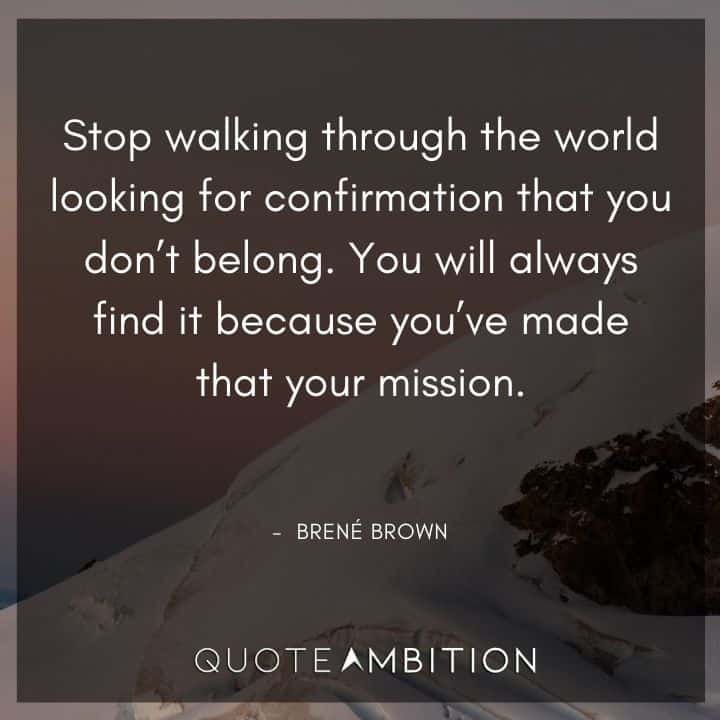
135. “Stop walking through the world looking for confirmation that you don’t belong. You will always find it because you’ve made that your mission.”
136. “Connection is why we’re here; it is what gives purpose and meaning to our lives.”
137. “Stop scouring people’s faces for evidence that you’re not enough. You will always find it because you’ve made that your goal.”
138. “The power that connection holds in our lives was confirmed when the main concern about connection emerged as the fear of disconnection—the fear that something we have done or failed to do, something about who we are or where we come from, has made us unlovable and unworthy of connection.”
139. “True belonging and self-worth are not goods; we don’t negotiate their value with the world.”
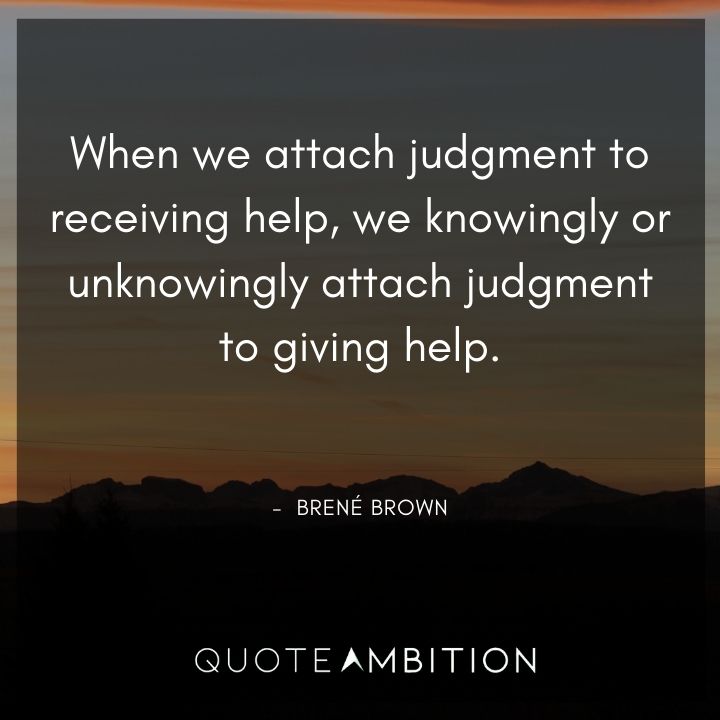
140. “When we attach judgment to receiving help, we knowingly or unknowingly attach judgment to giving help.”
141. “One of the greatest barriers to connection is the cultural importance we place on doing it alone.”
142. “True belonging is the spiritual practice of believing in and belonging to yourself so deeply that you can share your most authentic self with the world and find sacredness in both being a part of something and standing alone in the wilderness.”
143. “True belonging doesn’t require you to change who you are; it requires you to be who you are.”
144. “Maybe stories are just data with a soul.”
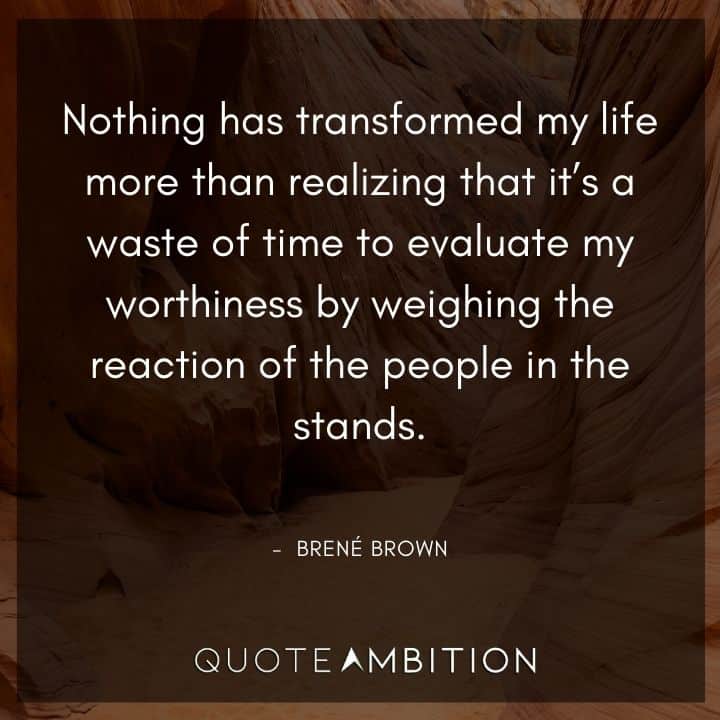
145. “Nothing has transformed my life more than realizing that it’s a waste of time to evaluate my worthiness by weighing the reaction of the people in the stands.”
146. “Don’t ask what the world needs. Ask what makes you come alive, and go do it. Because what the world needs is people who have come alive.”
147. “I often say that Wholeheartedness is like the North Star—we never really arrive, but we certainly know if we’re headed in the right direction.”
148. “We don’t have to do all of it alone. We were never meant to.”
149. “Living a connected life ultimately is about setting boundaries, spending less time and energy hustling and winning over people who don’t matter, and seeing the value of working on cultivating connection with family and close friends.”
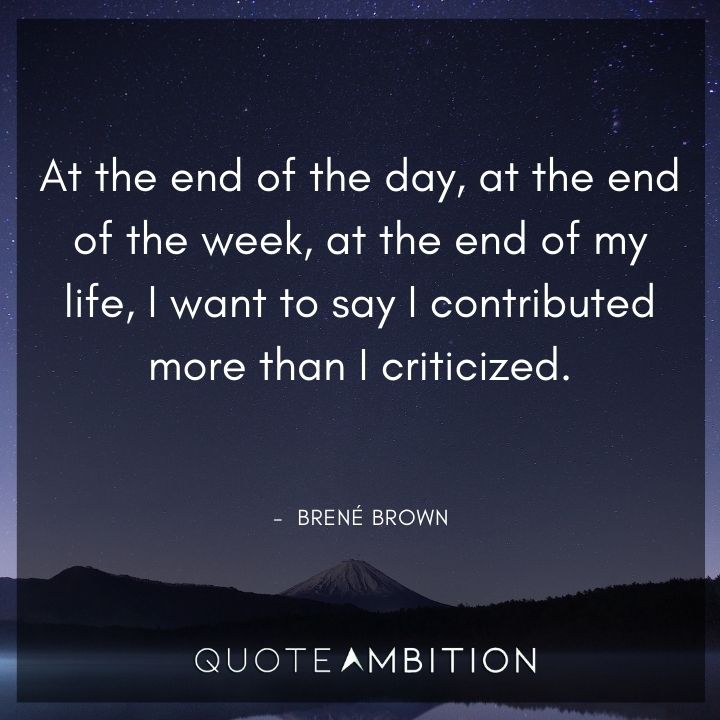
150. “At the end of the day, at the end of the week, at the end of my life, I want to say I contributed more than I criticized.”
Do You Dare to Show Your Vulnerability and Authenticity to Others?
To be truly strong, one has to face his vulnerabilities—his weaknesses, flaws, and imperfections—first. In today’s world, we’re taught that if we’re able to suppress our feelings, that shows strength and power. However, this is the exact opposite of Brené Brown’s findings. For her, showing others your vulnerable side is anything but weakness, because it is only through strength and courage that we’re able to show others a different, more ‘imperfect’ side of ourselves. We should dare to accept who we are for what we are—face our flaws and move forward in order to achieve excellence. Because at the end of the day, what we should truly strive for is not perfection, but the best version of ourselves.
Which of these Brené Brown quotes struck you the most? Are you ready to embrace your flaws in order to become the best version of yourself? Let’s have a discussion in the comments section below.
